The best job in the world – and the toughest. Inside the basement held by infantrymen defending Chasiv Yar

Every night, as he settles onto the wide double bed in one of the basements of Chasiv Yar, Andrii takes off his fatigues, his black boots, and his left leg. He leans it against a pile of fresh logs and collapses onto the edge of the bed.
Andrii is lucky – his sleeping spot is closest to the blazing stove. Towards the end of winter and in early spring, the temperature outside drops to a couple of degrees below zero.
Andrii has had a prosthesis for his left shin for a year and a half. In summer 2022, while he was driving an infantry fighting vehicle in one of the liberated villages in Kharkiv Oblast, he drove over an anti-tank mine and lost his heel. To implant the prosthesis, doctors had his leg amputated almost up to the knee. It took a year for him to recover and be approved by the medical evaluation board.
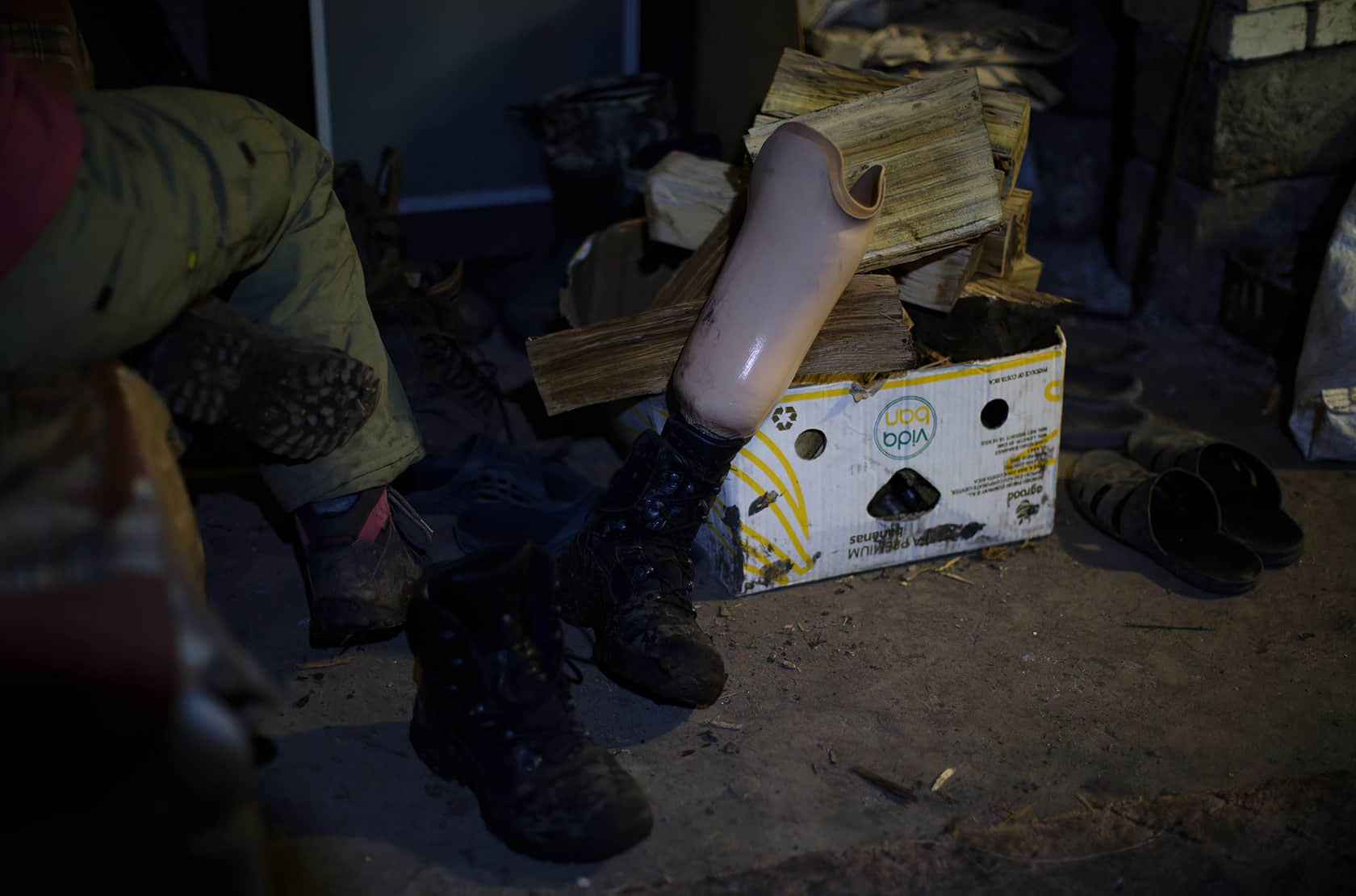
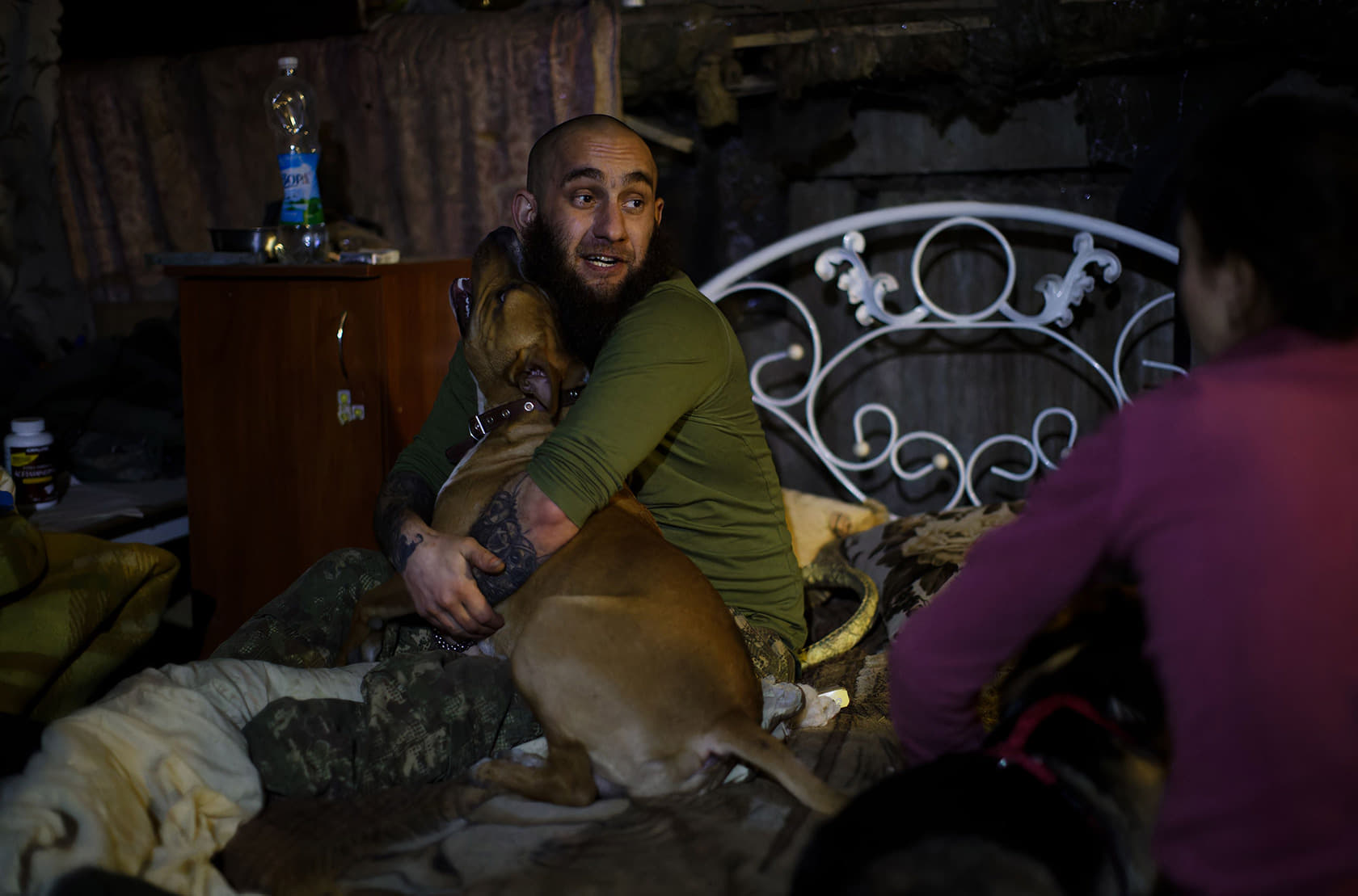
After the amputation and prosthetic rehabilitation, Andrii was offered a transfer to a rear unit or a job at a military enlistment office, but he chose to join the infantry and fight near Bakhmut. He reached the fortress city and stayed there for a week when his brigade, the 93rd Kholodnyi Yar Mechanised Brigade, was in the middle of heavy fighting there in spring 2023. With his prosthesis, he jumped into an infantry fighting vehicle which was immediately hit by a Russian RPG round. Once again, he survived.
"My mum said I was a fool, and my ex-wife said pretty much the same. But I didn't feel that way myself. I believe I did the right thing," says Andrii.
There's not a hint of heroism nor a trace of disappointment or bitterness in his tone – just a subtle undertone of weariness. After fifteen years in the army, Andrii is used to discussing war as if it were just another job. But can it really be called that?
After Bakhmut, Andrii fought in nearby Klishchiivka, trudging up to seven kilometres a day and feeling utterly exhausted. Following a long and arduous operation on the front lines, his leg swelled up so much that it no longer could fit into the prosthesis. Now Andrii is defending Chasiv Yar, leading a squad in a company run by a guy who goes by the alias Psycho.
As this article goes to press, the Russian army is merely a kilometre away from the city's boundaries.
Despite all he has seen and experienced, Andrii refers to his service – repeating the iconic line from the movie Fury – as "the best job I ever had".
"I spent eleven years working in a coal mine – I didn't like that, but I liked the army," he adds.
Infantry is rarely a choice, especially for someone with a prosthetic. It's more often the destination for those not selected for air assault troops, marines, or artillery. It's a place where you need to be able to "listen to the sky", shoot accurately with a decommissioned AK-47, and above all, survive.
As well as being "the best job", being an infantryman is also the toughest.
"Infantry is the end of the line; there's nothing beyond it," adds one of Andrii's comrades, who asks us not to disclose his name. "Here, it's like being among pirates; all the darkness of society is gathered. There are no professional soldiers here – everyone’s a civilian: that’s a banker sitting over there, and I'm a steelworker. There's nothing romantic about it; everything is very scary. Dirt, stench, blood, crap – that's the infantry.
People who are transferred to the infantry and know what it's like run away – only newcomers come and stay. Then they look at it and run away too. Ask [anyone] about the AWOL rate. And yet there's no mobilisation."
Ukrainska Pravda spent a couple of days with Psycho’s company, the infantrymen of the legendary 93rd Kholodnyi Yar Mechanised Brigade who are defending Chasiv Yar in Donetsk Oblast.
Read our story to discover what life is like for the Ukrainian infantry under practically Russian-controlled skies amid critical ammunition and personnel shortages.
The interviewees’ way of talking has been preserved. At the time of publication, the company's location has changed.
***
If there was a unit that the war could be measured by, it would be a forest belt.
Ukraine is full of these narrow strips of forest, planted to protect the crops from dust storms and soil erosion. But over the past decade, they have acquired a whole new meaning.
The forest belts are fought for with shovels, mortars, and bare hands. The soldiers dig themselves in like moles. They rejoice when spring comes, and whenever even a tiny bit of greenery sprouts on the trees shattered by artillery fire, thanks to which they can camouflage their position. And all because the forest belts divide the territories into "ours" and "the enemy's".
Images of the forest belts between Chasiv Yar and Bakhmut are beamed 24/7 onto a plasma TV in the Chasiv Yar basement where a section of Psycho’s company lives. To a civilian eye, they look like a piece of bare and beaten forest, but to the military, they are a collection of targets.
"Oh, there’s two Russians bringing something, probably food," Psycho, the company commander, says as he peers into the live stream from the Mavic drone.
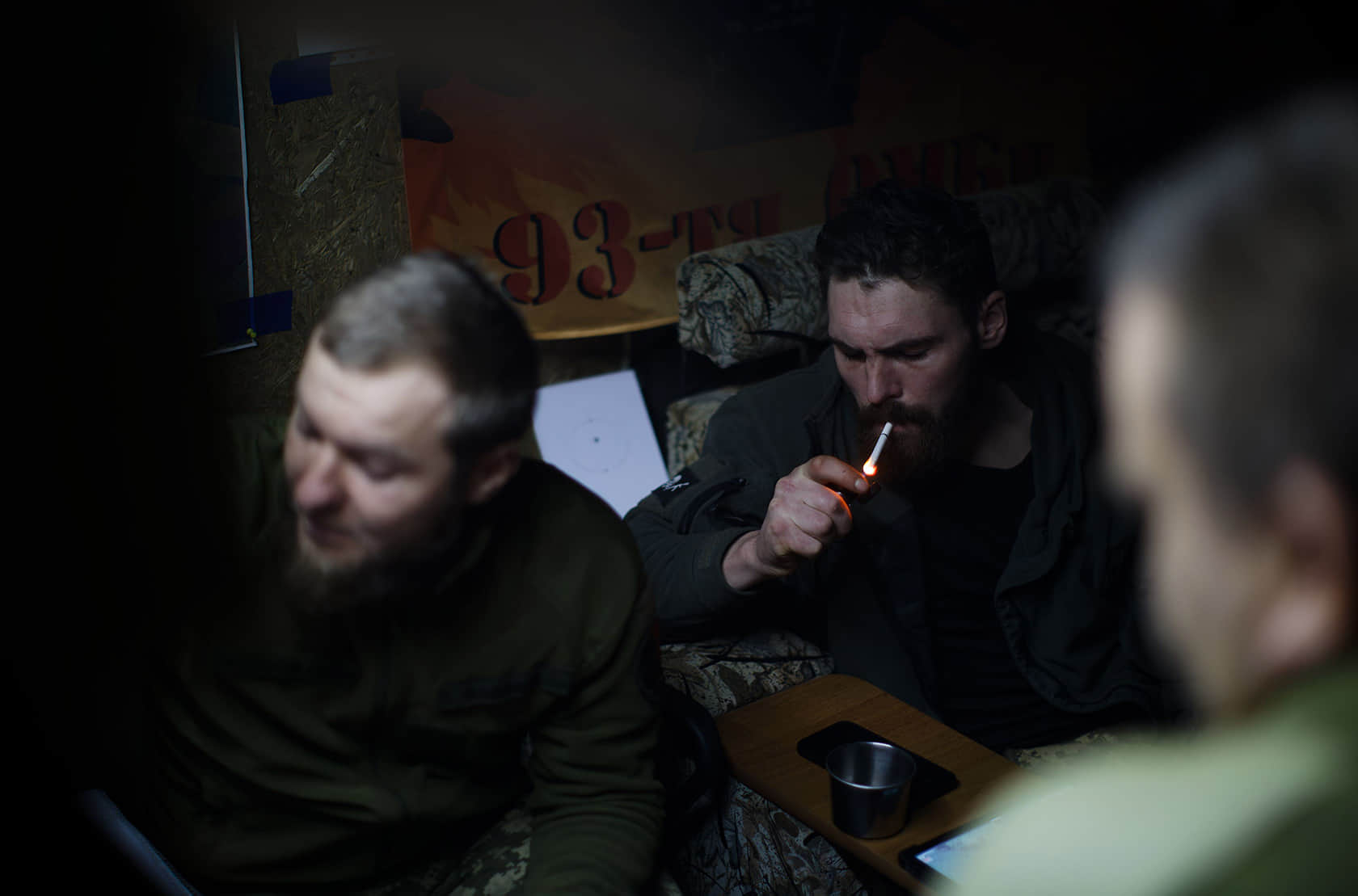
Psycho is 25 years old, and in most people’s eyes, he's someone who was "born for war" – that is, a professional soldier. After leaving school, he enrolled in the Military Institute of Kyiv National University to study psychology (hence the alias), then joined the 93rd Brigade, was promoted to platoon commander, and eventually became a company commander.
When he was 16 he would rather have attended a vocational school and become a car mechanic, but his mother, who raised him single-handedly, insisted that he go to Kyiv National University. After all, the high marks he achieved in the entrance exams shouldn’t go to waste.
"But now I have no regrets about joining the military right after school. On the contrary, if I’d been working on engines and suddenly there was a war, I'd have been like, 'Are you kidding? What should I do?' They'd have thrown me into a trench, and I'd have been so terrified that I would never have come out even to look through a thermal imager because it's scary. But this way, I already knew what to do," Psycho shares.
Psycho’s company holds a front line that’s 1,200 metres (three-quarters of a mile) long. That's like the length of Kyiv’s main street, Khreshchatyk, from Bessarabska Square to European Square, except that instead of a pavement on one side, there’s the Russian army. And they keep trying to cross the road.
January 2024, when the сompany began its mission to defend Chasiv Yar, was when the Russians started using large-scale FPV drones to hunt for Ukrainian infantry. That complicated everything: equipment and position maintenance, evacuation of the wounded and the dead, and personnel replacement.
"Anyone who enters this position will definitely be fired on. If it's not a mortar, it's a strike from a Mavic; if it's not a Mavic, then it's a cluster munition, and if it's not that, then it's a barrage of gunfire. That’s the everyday routine," Psycho explains.
Electronic warfare could potentially be utilised to counter Russian FPV drones. But the implementation of EW devices does not rely solely on volunteers supplying them; it’s more that their effectiveness remains uncertain. Alternatively, infantrymen could fire on Russian drones themselves with anti-drone guns or their own rifles. But it’s a tough challenge, explains an infantryman who goes by the alias Happy, who is sitting next to Psycho. He returned from his position six days ago.
"While you're shooting at one, another one promptly drops something on you. In our case, it happened like this: first, one drone was hovering for ages, then another one arrived and dropped something. Our comrade had only just managed to get his rifle from the trench when a third FPV drone, which we didn't even hear, flew in and crashed into the dugout," Happy says.
***
If anyone tells you that food delivery services like BoltFood or Glovo don't work during wartime, don't believe them. First, ask about the person in the unit who delivers packages from Nova Poshta [a Ukrainian delivery company – ed.] to the most remote basements. In Psycho’s company, that person’s name is Rodia. And for the past year and a half he's been delivering all sorts: people, ammunition, food, and even volunteer shipments.
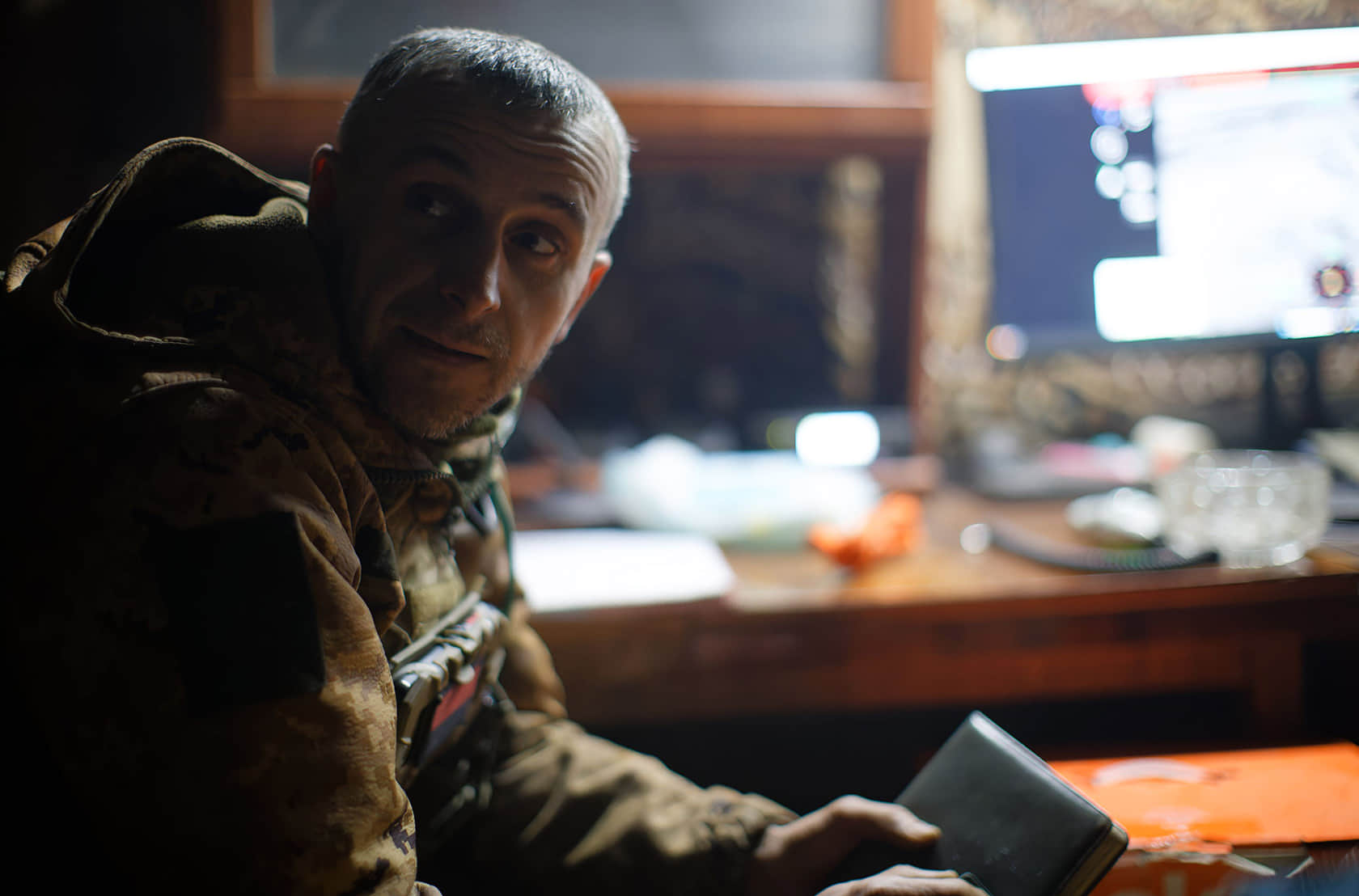
Rodia's journey to becoming the main delivery person for the company began with his desire to "register" himself in his own apartment in Ternopil, in Ukraine’s west – thus confirming that it was his actual place of residence, which also meant that people from the military enlistment office could find and recruit him easily. When he went to the military enlistment office, they cleared him for duty within just fifteen minutes despite the fact that he had previously been deemed unfit for service on health grounds. And after just fifteen days of basic training, he was defending Kharkiv Oblast.
"I remember when I arrived at the 93rd Brigade, they showed me my military ID, which said 'BMP-1 gunner', and I didn't even know what a BMP was! [BMP is an abbreviation meaning infantry fighting vehicle (IFV). However, Soviet-era IFVs are commonly referred to as BMPs in many post-Soviet countries – ed.] But I got lucky: our company didn't have any of those vehicles at the time," Rodia recalls, his laughter filling the basement. "So they quickly reassigned me as a 'grenade launcher operator’s assistant'. We probably had a grenade launcher, but I didn't know what that was either."
After the defence of Kharkiv Oblast, when the 93rd Brigade was not given a chance to experience the great offensive and was transferred to the Bakhmut front, Rodia was assigned a place on a Soledar slag heap. To his right was the German-owned Knauf factory, and to his left the village of Yakovlivka, with Russian troops right across the road. August 2022 marked the beginning of the Russian offensive on the town of Soledar.
It then transpired that not only did Rodia have no idea what a BMP-1 or a grenade launcher was, he didn’t know what a slag heap was either.
"We don't use that word in Ternopil!" the defender explains. "They took me to this slag heap on a motolyha (an MTLB armoured vehicle), and some guy shouted, 'Follow me!', and there was a rope [for climbing – ed.] hanging there. We took shovels with us as well, thinking we would dig. But when we got to the slag heap, we realised that a shovel was no good. We had to use pickaxes.
They told me: 'You'll be there for four days, and then you'll go on leave!' But they forgot about us and asked us to do four more days of fighting to help out a neighbouring company. That wasn’t on the slag heap, but to the left, on the road to Yakovlivka. There, I was assigned to the Yasen position," Rodia adds.
Rodia spent not four days but five weeks in Soledar. He left after sustaining his first injury, when shrapnel from a Russian cluster munition flew into his leg and his fingers. That day, he had gone in search of the crew of an armoured personnel carrier that had been struck by the Russians, and ended up under fire himself. A total of eight soldiers had been wounded, and one of them later died. The evacuation took a day and a half and was carried out on foot.
Rodia did get leave, but it was to recover from his injury. Later, the medical board declared him fit for military service, Rodia says with both smiles and sadness, while his brigade found him fit for the position of driver. For a long time, Rodia drove his family's white 2006 Fiat Doblo at the front.
"Everyone else was driving pick-up trucks and armoured vehicles, and we had this white Doblo with a green grille on the front," Rodia says, laughing again. "The car’s back at home now, we’ve repaired it. I think it's waiting to come back, and it will if need be."
A year and a half on, Rodia recalls his time in Soledar – which included digging a slag heap to make shelters, his first injury, and evacuation on foot – almost as if it were a summer holiday. This is another effect of war: every day that doesn't kill you is remembered as a good one.
However, there’s also the fact that Rodia's time in Soledar was in the summer, which was hot, dry, and had fifteen hours of sunshine a day. The next period, in Bakhmut, came in the cold autumn and snowy winter. In Bakhmut it felt like winter all the time, especially in April and May 2023.
***
The word Bakhmut links the stories of most of the heroes in this article.
The 93rd Brigade paid with their lives for the defence of the city, which has earned the poetic name of "Fortress Bakhmut". The brigade was deployed to the area in the autumn of 2022 and served there until the Ukrainian forces withdrew in mid-May 2023.
The forest belts on the outskirts, the area across the river, the railway, the city centre, the last high-rise buildings ─ Ukrainska Pravda journalists had been watching the 93rd Brigade fight for this city for almost nine months.
There was an episode in April 2023 that sticks in the memory, when one battalion commander, describing the dire situation in the city, told his comrade-in-arms: "I have four infantrymen left for three company commanders." After suffering heavy losses, the brigade fought in Bakhmut with attached units, including soldiers from the Territorial Defence Forces.
Andrii describes Bakhmut as a place he was desperate to leave for after a year of hospital stays and being cleared by military medical boards. Psycho refers to it as the town in which he survived. Two of the other heroes in this story, alias Kit (Cat) and Shchaslyvyi (Happy), remember Bakhmut as the land of their baptism of fire. They were sent to Bakhmut right after training at the end of the defensive operation in May 2023 and stayed there for a week.
Cat recalls that there was almost nothing left of the company by then. The new recruits had no one to ask where to go, what to do and why.
"But I wasn't afraid to join the infantry," says Cat. "A relative of mine, may he rest in peace, had served since 2014 – he was always in the infantry, so I knew what it would be like thanks to his stories. I get it, there was no one back then."
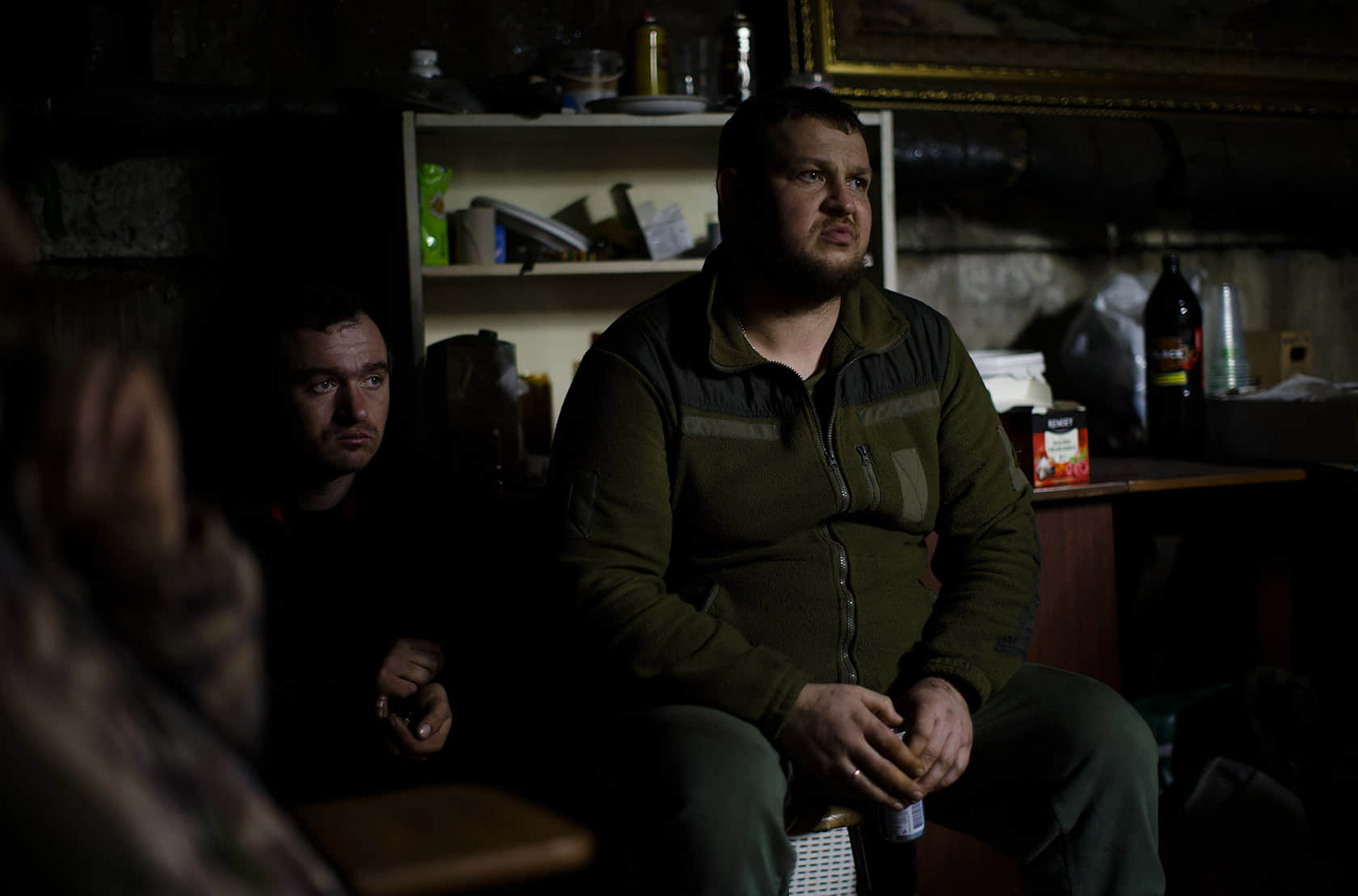
When he talks about his week in Bakhmut, Happy frequently mentions the five-storey building on the western outskirts of the city where he was holding the line. It was relatively intact on 1 May, but by the 7th, it was in ruins. First Russian strikes knocked out bricks, then slabs began to shake, and finally, the building collapsed in entire spans. Happy ended up in hospital with concussion on 8 May.
"I didn't really think it would be like that," he recalls of his Bakhmut period. "Once, when I came out of the command and observation post (C&OP), everything was going boom, everything was wrecked – it was like the apocalypse!"
"We had C&OPs everywhere back then – from Zabakhmutka [a city district] to the last five-storey building," Psycho chips in. "When [the late Wagner leader Yevgeny] Prigozhin said: 'That's it, Bakhmut is ours! There’s only one five-storey building left!', we’d got the f**k out of there that morning – but we left the generator on!"
The soldier mentioned at the beginning of this story, who asked us not to reveal his name, speaks about Bakhmut in a whisper. Cautiously, as if testing our reaction, he says that he considers the defensive operation "a war crime for which someone will eventually have to answer". He says it took too many lives.
"You call it 'Fortress Bakhmut'. I say f**king Bakhmut. And so do a lot of people who got out of there alive. We’re waiting for missiles, F-16s, and air defence systems – but the infantry needs mortars and bombs to advance or at least hold the line.
I was in the west of Ukraine, and people there were wearing T-shirts that said 'Victory comes soon'. Why should anyone go [to fight] if victory is coming soon? It needs to be shouted from the f**king rooftops: 'Guys, you have to go because [otherwise] there’ll be no country – not [only] no Bambas (i.e. Donbas), but no country at all,'" the soldier adds.
***
Psycho greets the armoured unit, warming up their BMP in one of the forest belts, with a brief "You're for it!" He’s just kidding, but he does ask his men to stop leaving the ammunition for their BMP on the ground. Cat, who was transferred from the infantry to the armoured unit after being wounded in Bakhmut, nods in response.
Nowadays, this Soviet-era vehicle has little work to do on the Bakhmut front because it’s too visible to the Russians as they terrorise the area with First-Person View drones.
"With a 'sivikha' (a Swedish-made CV-90 infantry fighting vehicle) operating from a well-camouflaged position, you can't even see it through a 'ptichka' (drone) thermal imager – you'll only hear the vehicle coming when it's 600 metres away. But with this 'bekha' (BMP), you only had to start it and the Russians would know our company was about to attack!" Psycho explains.
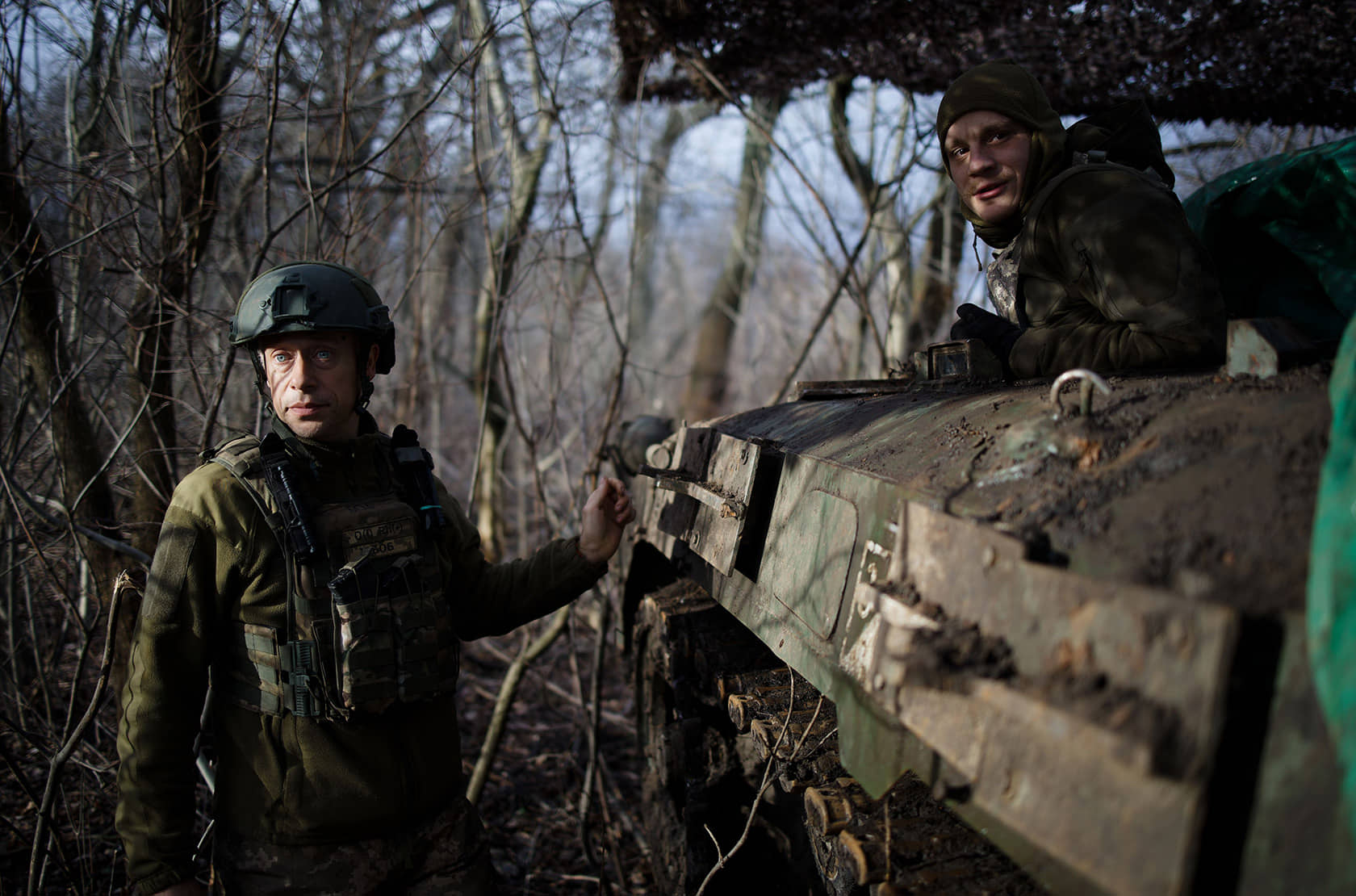
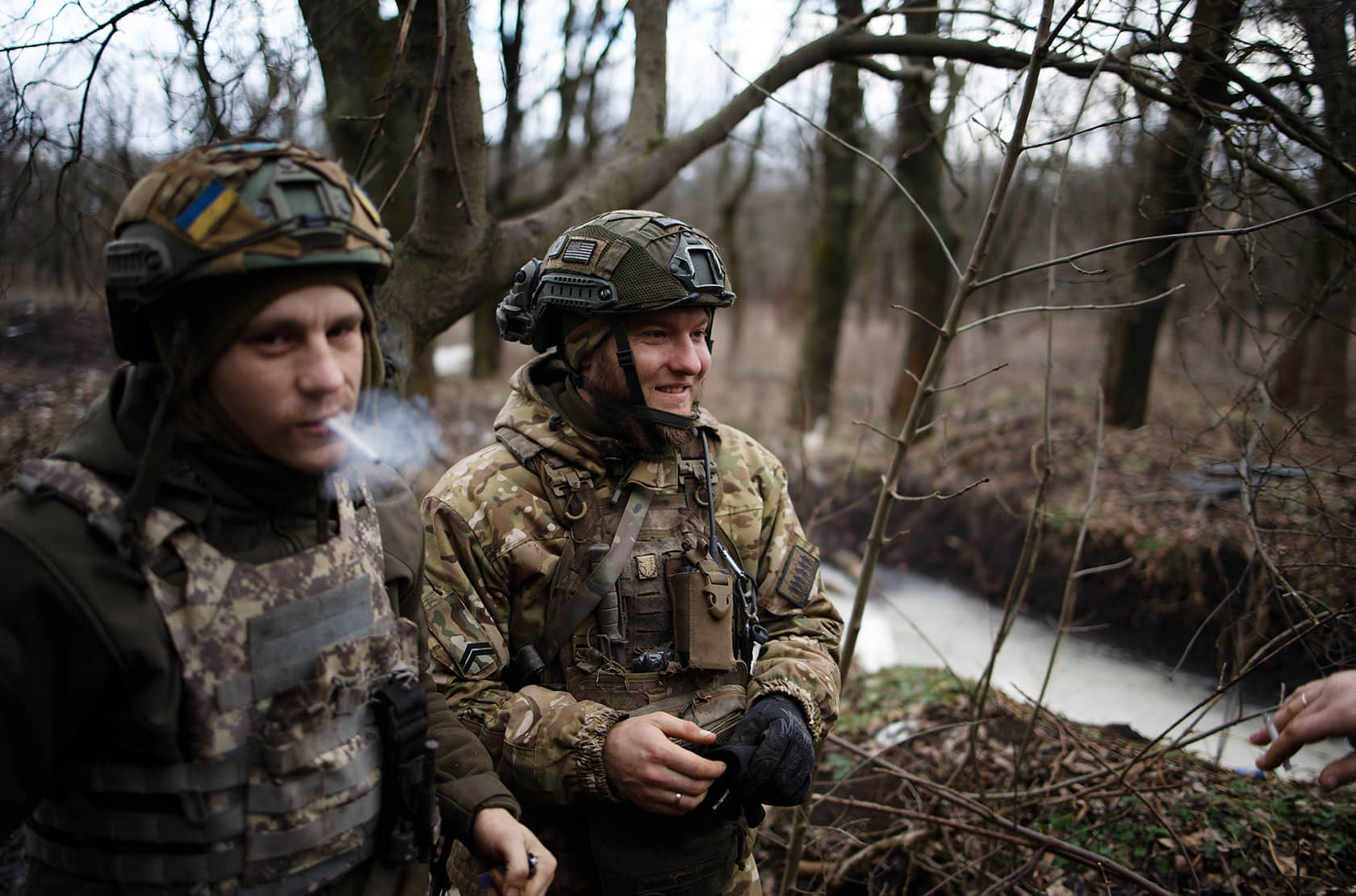
So instead of their primary task of transporting infantrymen and engaging the Russians, most of the work that Cat and his brothers-in-arms do is evacuating the dead and wounded.
If it’s too risky to use the BMP for evacuation, the armoured unit switches to an ATV. Its tiny square body can accommodate four wounded soldiers with their legs tightly squeezed together. The ATV has been fitted with an experimental anti-FPV electronic warfare system provided by volunteers.
"What happened yesterday was, I picked up a dead soldier, got in, and the ATV stalled," Cat says. "I was a bit scared... but it was okay, I started it up and kept going. I didn't know that soldier, he’d been lying there for about four days. And this wounded soldier – his leg had been ripped off – kept thanking me. I was dragging him out, and his flesh got caught on an acacia tree and he said 'Ow.' I answered: 'Be brave'."
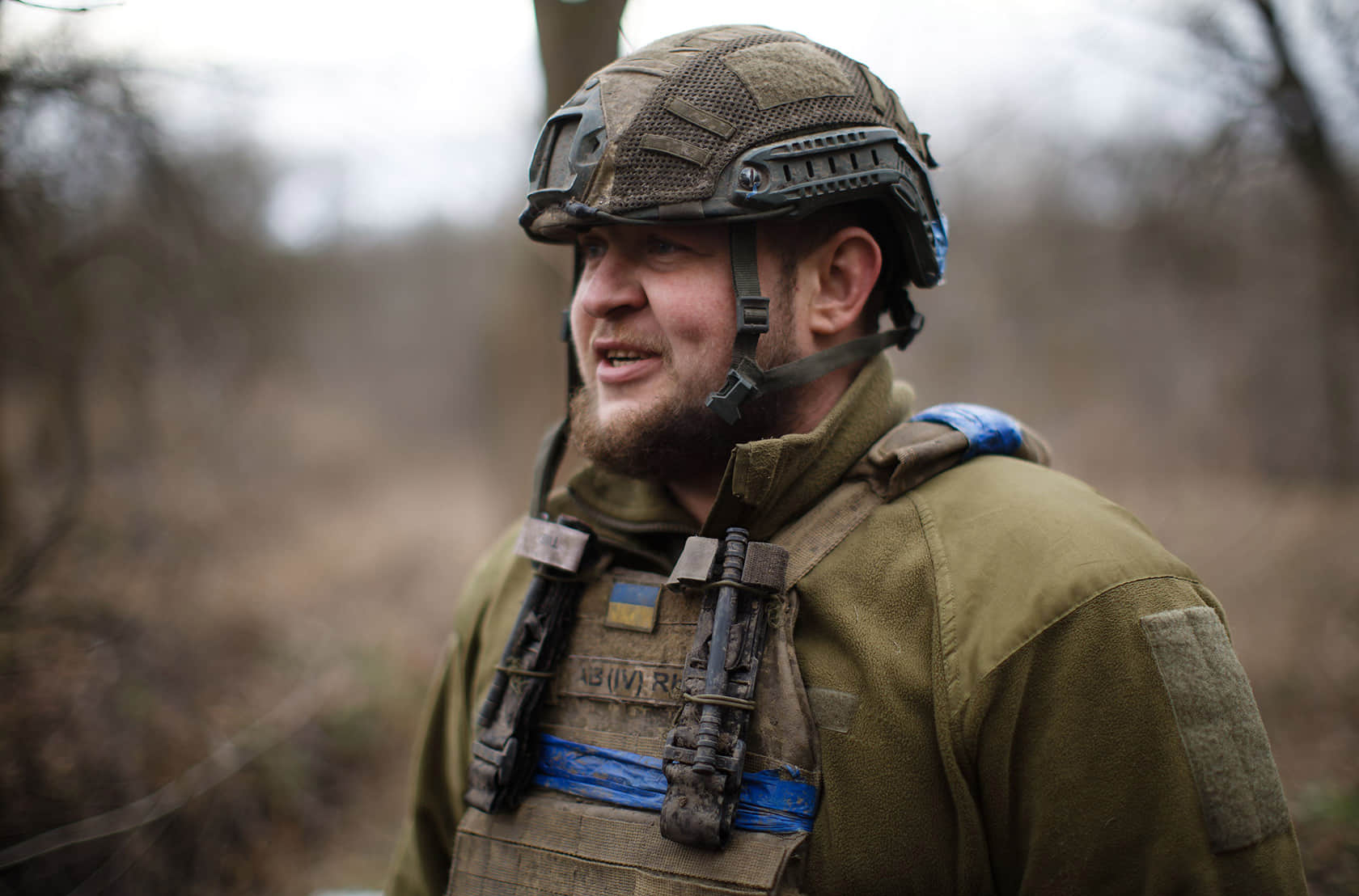
At 15:15, the buzzing of an FPV drone can be heard in the sky. It’s followed by gunfire, attempts to shoot it down, and finally, a loud explosion. Bang. Then the second, third and fourth explosions mingle with the sounds of Ukrainian artillery.
"Did you hear any debris come down?" Psycho asks Cat.
More explosions follow: six, seven, eight, nine. Boom, boom, boom. No one flinches. Psycho, as the resident therapist, explains this apparent lack of concern: "Fear is replaced with not giving a f**k."
***
At 17:36, Psycho yells into his radio: "There’s a f**ker, a f**ker’s left their positions, fire! Fire, fire! Use a tube [an RPG-7] if you can." The voice on the other end replies: "Roger that."
A few moments later, the live stream from the drone camera breaks up. Apart from Psycho’s orders, the silence in the basement is interrupted only by loud snoring. A couple of blankets and rugs are all that separate the command post from a room that sleeps 20-25 people.
At 17:50, the person on the other end of Psycho’s radio reports that they hit their target: "Got him!" Psycho orders them to fire again to make sure: "Fire again at the same spot where the previous rocket went off. Use a PK machine gun or a Kalashnikov rifle. The f**ker is Cargo 300 [wounded], he’s running away, fire on their positions. Deploy the RPG again if you can. Prepare a shrapnel shell."
***
At 19:42, the screech of duct tape fills the basement: two soldiers are putting together packages of drinking water for soldiers at the infantry positions. Drinking water is one of the most sought-after and valuable resources there.
"We drink less water here, but when you’re at the positions, you’re always thirsty: you inhale tons of gunpowder, you shoot, you sweat," Happy explains.
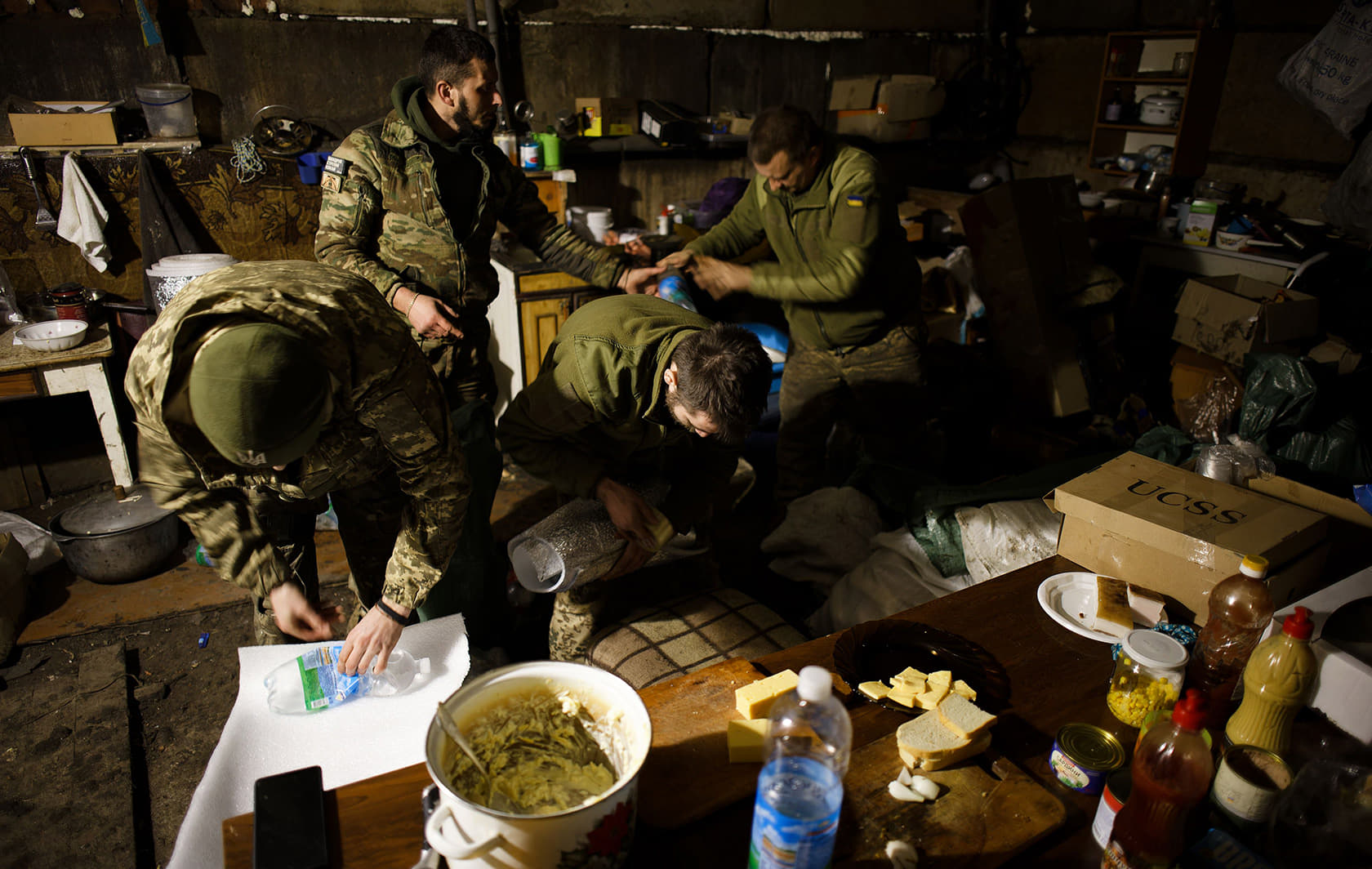
A large agricultural drone, which can carry up to 10 kg, will be used to deliver the water. This means the senders have to partially empty the bottles of water so that they’re only a third or half full. This is to ensure the bottles don’t break when they hit the ground from 100 metres up – roughly the height of a 25-storey building. The bottles are then wrapped in insulation material, taped together, and placed in polypropylene bags.
It’s impossible to drop the water from a lower height because there’s a risk of losing the drone if it goes up or down too abruptly.
Around 20:00, while some of the soldiers are still preparing the water parcel, others make dinner. The smell of hot, meat-filled varenyky dumplings, spicy pickled carrots, and seaweed salad cuts into the cigarette smoke that fills the basement.
***
At 21:03, a voice on the other end of the radio asks whether anyone could replace two soldiers who are due to go on rotation today. "Yes," the command post responds. The voice on the other end explains: one of the soldiers who is currently deployed to the front line is afraid he’ll be left on his own because of this rotation. "That’s happened before," the soldiers in the basement say, nodding in agreement.
***
The only way to tell that morning has arrived in the dark, windowless basement is by the general sense of bustle and the way Sergeant Tanchyk, the company’s commander, raises his voice – after seven in the morning, he’s less worried about waking up one of his soldiers.
Tanchyk monitored the radio from two in the morning, when Psycho wrapped up his day. The radio is used to monitor aerial reconnaissance reports, give orders to open fire, and relay information from positions on the ground to the battalion command post.
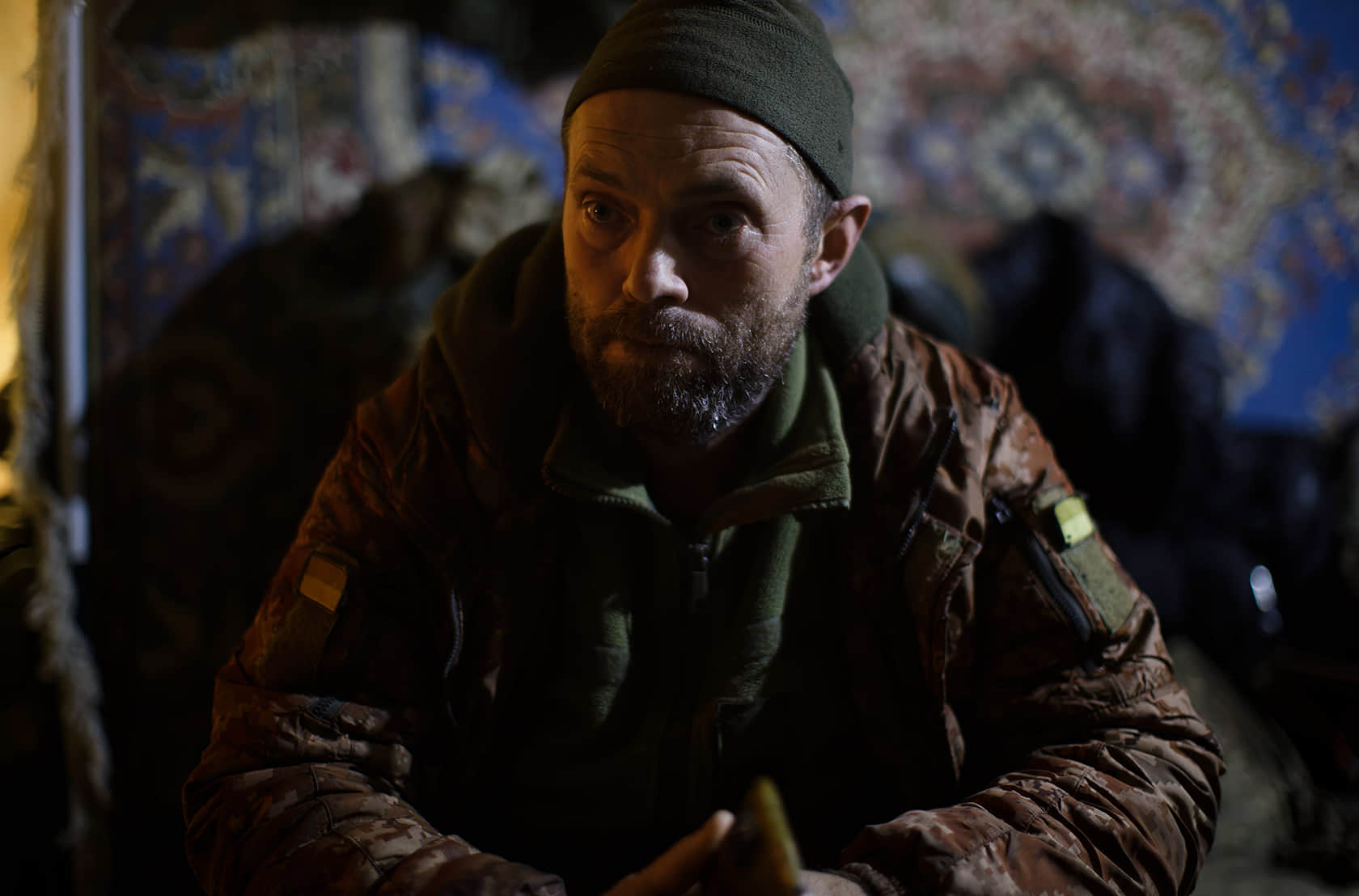
Last night’s – and early morning’s – major task was to rotate soldiers to and from several positions between Chasiv Yar and Bakhmut. With Russia now deploying swarms of FPV drones, the company has seen some of its biggest losses during rotations.
Just after nine last night, minutes after the voice on the radio asked whether two soldiers could be replaced, one of the soldiers who was supposed to be a replacement sprained his ankle and was ordered to go back to base. Another soldier suffered an asthma attack that same night.
"First I told the guys at the position that we’d have someone to replace their two fighters, but then I asked them if they’d heard what happened – they said yes," Tanchyk says, not looking up from the floor. "I promised them we’ll figure something out. You can manage three days at the positions, but a week… Although when we were in Soledar no one came to replace us. We stayed from the moment we got there. But it was less frightening there."
The soldier who suffered an asthma attack is warming up by the stove, occasionally hiding his face in his large hands, kicking himself for not being able to carry out his mission. His name is Yura, and he’s 44. He developed asthma after the start of the full-scale invasion.
Yura is a machine gunner, not an infantryman. But one of war’s unspoken rules is that when there are no infantrymen left, everyone becomes an infantryman – including machine gunners. Just as when the ranks are running low, everyone – including people with asthma – is welcome to join.
Today is the first day Yura has felt so unwell he couldn’t even make it to the position.
"I needed to rest, but there’s nowhere to rest on the way there. I didn’t have an inhaler with me," Yura explains. "When we were told we’d have to join the infantry, no one wanted to do it, but I… If everyone refuses to go, who’s gonna fight?"
***
At 08:11, position N reports two pieces of news over the radio: first, shelling was underway, and soldiers were hiding in the basement; second, "Elon Musk" – meaning a Starlink satellite – was out of order.
Later they ask whether they can fire back at the Russians. Tanchyk replies: "Our commanders told us to watch our ammo use, but as soon as they [the Russians] move, we’ll fire." At 08:53, position N reports that the shelling was followed by bombing.
***
Bohdan and Edik, two infantrymen who were lucky enough to get back from the frontline positions last night, enter the basement just after eight. They spent six days some 100-150 metres away from the Russian positions, including four days without water. They quickly ran out of the water they’d brought with them, and all the bottles that were dropped from the drone kept breaking when they hit the ground. Only one bottle from the latest drop remained intact.
Bohdan coughs loudly as he rests against the table, two bowls of last night’s varenyky waiting for him and Edik.
They only had trench candles to keep themselves warm for the past week. Edik starts coughing too.
Both are around 40-45 years old. Bohdan spent most of his life working in a quarry, and Edik used to work in a mine. They were assigned to the infantry because everyone aged 25-35 was assigned to the marines or the Kraken special unit of Ukraine’s Defence Intelligence. For Edik, it was the first time he’d ever been in frontline positions.
"Have you often been hit by Russian drones?" we ask the guys, who are diving into their breakfast.
"Seems like drones are all there is now. They keep dropping bombs," Edik says.
"I think they learned from us," Bohdan adds. "And now they know what to do, like clockwork: as soon as our guys show up, boom – they hit that spot. I think they use more drones to drop VOGs (rocket-propelled grenades), hand grenades and bombs than they use FPV drones. You can hear drones very clearly at the position, and you can guess what they’re carrying. Sometimes they even sound heavy – then you know there’s something major coming your way."
"What do you do when you hear a drone?" we ask.
"We hide. We shoot at it if we can – but while a drone can easily hit its target, whether you hit the drone or not is less certain…" Bohdan replies.
"Shooting at a drone? Come on! We just hide in the trenches, tell it like it is," Edik chimes in.
The cook asks Bohdan if he’d like something else to eat.
"No thanks, I’m still just so thirsty," he replies.
Olha Kyrylenko, Ukrainska Pravda
Photos: Dmytro Larin
Translation: Sofiia Kohut, Artem Yakymyshyn, Olya Loza
Editing: Ivan Zhezhera, Teresa Pearce